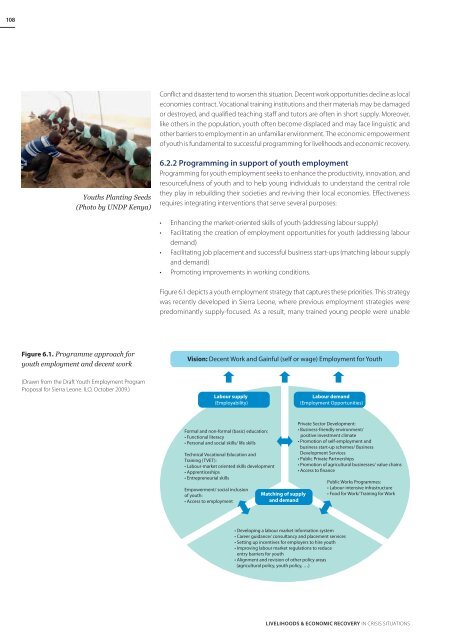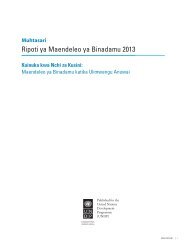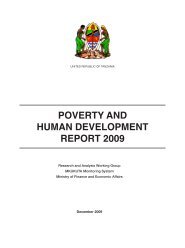Download PDF (4.08 MB) - ReliefWeb
Download PDF (4.08 MB) - ReliefWeb
Download PDF (4.08 MB) - ReliefWeb
Create successful ePaper yourself
Turn your PDF publications into a flip-book with our unique Google optimized e-Paper software.
108<br />
Conflict and disaster tend to worsen this situation. Decent work opportunities decline as local<br />
economies contract. Vocational training institutions and their materials may be damaged<br />
or destroyed, and qualified teaching staff and tutors are often in short supply. Moreover,<br />
like others in the population, youth often become displaced and may face linguistic and<br />
other barriers to employment in an unfamiliar environment. The economic empowerment<br />
of youth is fundamental to successful programming for livelihoods and economic recovery.<br />
Youths Planting Seeds<br />
(Photo by UNDP Kenya)<br />
6.2.2 Programming in support of youth employment<br />
Programming for youth employment seeks to enhance the productivity, innovation, and<br />
resourcefulness of youth and to help young individuals to understand the central role<br />
they play in rebuilding their societies and reviving their local economies. Effectiveness<br />
requires integrating interventions that serve several purposes:<br />
• Enhancing the market-oriented skills of youth (addressing labour supply)<br />
• Facilitating the creation of employment opportunities for youth (addressing labour<br />
demand)<br />
• Facilitating job placement and successful business start-ups (matching labour supply<br />
and demand)<br />
• Promoting improvements in working conditions.<br />
Figure 6.1 depicts a youth employment strategy that captures these priorities. This strategy<br />
was recently developed in Sierra Leone, where previous employment strategies were<br />
predominantly supply-focused. As a result, many trained young people were unable<br />
Figure 6.1. Programme approach for<br />
youth employment and decent work<br />
Vision: Decent Work and Gainful (self or wage) Employment for Youth<br />
(Drawn from the Draft Youth Employment Program<br />
Proposal for Sierra Leone. ILO, October 2009.)<br />
Labour supply<br />
(Employability)<br />
Labour demand<br />
(Employment Opportunities)<br />
Formal and non-formal (basic) education:<br />
• Functional literacy<br />
• Personal and social skills/ life skills<br />
Technical Vocational Education and<br />
Training (TVET):<br />
• Labour-market oriented skills development<br />
• Apprenticeships<br />
• Entrepreneurial skills<br />
Empowerment/ social inclusion<br />
of youth:<br />
• Access to employment<br />
Matching of supply<br />
and demand<br />
Private Sector Development:<br />
• Business-friendly environment/<br />
positive investment climate<br />
• Promotion of self-employment and<br />
business start-up schemes/ Business<br />
Development Services<br />
• Public Private Partnerships<br />
• Promotion of agricultural businesses/ value chains<br />
• Access to finance<br />
Public Works Programmes:<br />
• Labour-intensive infrastructure<br />
• Food for Work/ Training for Work<br />
• Developing a labour market information system<br />
• Career guidance/ consultancy and placement services<br />
• Setting up incentives for employers to hire youth<br />
• Improving labour market regulations to reduce<br />
entry barriers for youth<br />
• Alignment and revision of other policy areas<br />
(agricultural policy, youth policy, …)<br />
Livelihoods & Economic Recovery in Crisis Situations





